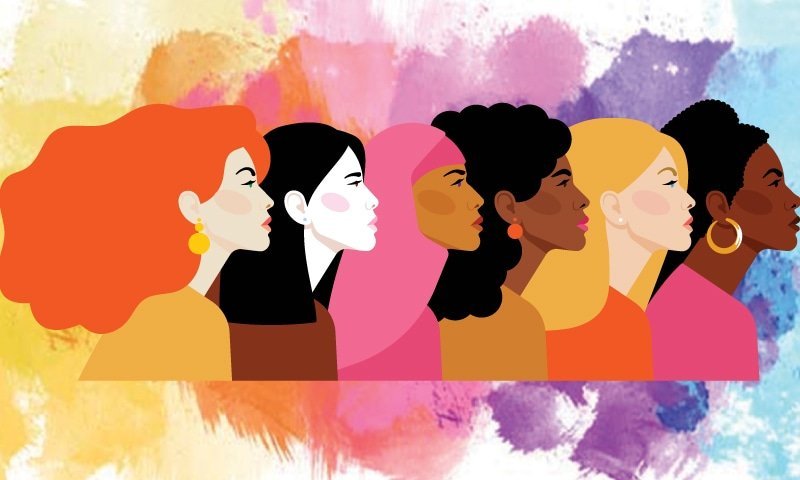Feminism does not exist in India. Rather, feminism does not exist in the world, irrespective of how progressive the society is. However, it would be wrong to say that our society isn’t trying to get to a point of equality. The disparity between the sexes isn’t a rural trend alone. Every major profession, city and country is plagued by it.
This journey for gender equality has many sides, reflecting India’s rich mix of cultures and lifestyles. Exploring feminism here means understanding how old ways clash with new ideas, but also seeing how men and women are fighting for women’s voices and rights. It’s a complex story of tradition meeting change and women standing up for themselves in diverse ways, making India’s landscape of progress a vibrant tapestry of empowerment.
I’d like to start this narrative by busting a prominent urban myth, one that people are misguided about and proud of. KERALA IS NOT A MATRIARCHAL OR FEMINIST STATE.
The Paradox in Kerala: Matrilineal Heritage vs. Persistent Patriarchy
In Kerala, there’s a fascinating contradiction between its celebrated matrilineal heritage and the persistent dominance of patriarchal values. While the state is known for its matrilineal system, where lineage and property are traced through women, deeper scrutiny reveals that men still hold most of the power. Despite women’s prominent roles in families and communities, men tend to wield the ultimate authority, highlighting the complex interplay between feminism and patriarchy.
Traditionally, Kerala’s matrilineal setup granted women rare autonomy and inheritance rights, but alongside it, patriarchal norms dictated societal roles and favoured men. Despite women’s involvement in decision-making and contributions to household economies, men often hold the reins of political and economic power, reinforcing gender inequalities. Additionally, societal pressures push women into traditional roles, constraining their personal and professional growth. Though education and awareness have sparked some changes, deep-rooted patriarchal attitudes persist, evident in gender-based violence and discriminatory practices.
Feminism in Kerala confronts these contradictions, aiming to challenge traditional gender roles and secure equal opportunities. By advocating for women’s rights, feminists strive to dismantle patriarchal structures and foster a fairer society. However, resistance to feminist ideals remains, as some view them as a threat to existing power dynamics.
Despite the paradoxes, Kerala’s journey highlights the complexities of feminism and patriarchy in a unique cultural context. Efforts to reconcile tradition with modern values reflect the ongoing struggle for gender equality in the state.
Gender Dynamics: Exploring the Northeastern Region of India
The northeastern region of India is similar to a region that is intertwined with various cultural and traditional threads, each having a unique impact on the way gender relations are constructed here. The deeper we penetrate this mural, we find a comparative span of gender roles beginning from progressive to extremely patriarchal.
If we go to the northeast communities, we will be pleasantly surprised to find that egalitarian values are so widely accepted. These women are not just passive amplifiers but the ones who are actively involved in decision-making processes and household economies. They have higher independence in forming their destinies and hold a position equal to their male counterparts. Such communities are great examples of the implementation of feminism, which is the one that brings about the transformation of the already existing norms, for the better.
On the other hand, many regions in the northeastern part of the country will not let go of the old traditions of patriarchy. Here, the women have to follow the stereotypes and societal norms that confine them to a lowly position and prohibit them from getting education, employment and political participation. This continues the loop of unfairness and marginalisation and in doing so, stresses the immediate need for feminist intervention to rip out the oppressive structures from the system and liberate women.
The regional varying attitudes toward gender are diverse and yet feminism proves to be a uniting formant among the people in the northeastern region. It is a battle cry that not only promotes gender equality and opens up cultural barriers but also engages people to re-unite and fight for what is right. Be it by confronting established stereotypes, supporting policy reforms or organising mass movements, feminist action favours transformation and makes society more fair and inclusive.
Amid the maze of gender relations, the feminist principle of social justice and inclusion helps to build a platform in the northeastern region. Feminism, being a voice for a variety of voices as well as promoting unity, becomes a powerful tool for diminishing the differences that hinder a just and balanced future for all. As communities in the northeast continue to navigate the intricate interplay of tradition and modernity, the enduring legacy of feminism serves as a beacon of hope, guiding the way toward a more inclusive and egalitarian society. Through ongoing dialogue, advocacy and collective action, the northeastern region can harness the transformative potential of feminism to build a future where every individual, regardless of gender, can thrive and contribute fully to their communities.
Feminism Across India: Navigating Cultural, Social and Economic Landscapes
Feminism in India unfolds across a diverse terrain, encompassing urban centres and rural landscapes, each with its own set of cultural, social and economic dynamics. In bustling cities like Mumbai, Delhi and Bangalore, the momentum of feminism gains traction amidst a growing awareness of gender rights. Women here are asserting their autonomy, challenging traditional norms and making strides in traditionally male-dominated spheres. The emergence of feminist movements, advocacy groups and online activism amplifies voices calling for equality and an end to discrimination. However, deep-seated systemic inequalities persist, especially for women belonging to marginalised communities, who face intersecting forms of oppression.
In contrast, rural India presents a complex picture where mostly only the traditional patriarchal values exist. Women in these areas often find themselves confined to traditional roles within families and communities, with societal expectations dictating their place. While grassroots initiatives and women’s self-help groups offer pockets of empowerment, they often struggle against deeply ingrained beliefs in male authority and control. Economic disparities further complicate the feminist narrative, particularly for women from lower socioeconomic backgrounds. Limited access to education, healthcare and economic opportunities exacerbates vulnerabilities to exploitation and discrimination, perpetuating cycles of poverty and gender-based oppression.
Navigating this multifaceted landscape, the journey of feminism in India is characterised by resilience, defiance and hope. It acknowledges the complexities of tradition and modernity, challenging entrenched power structures while honouring diverse cultural narratives. As India grapples with the tensions between progress and tradition, the movement for gender equality evolves, driven by the unwavering resolve of individuals striving for a more inclusive and equitable society. Through ongoing dialogue, advocacy and collective action, the feminist movement continues to shape the fabric of Indian society, striving for a future where every individual, regardless of gender, can live free from discrimination and oppression.
The Pitfalls of Pseudo-Feminism (or Feminazi-ism): Unmasking Harmful Stereotypes
Pseudo-feminism is one of the main barriers to the achievement of authentic gender equality. Instead of promoting equality, it is just a mask that disguises the truth, often based on outdated female ideas and deep-rooted patriarchal power structures. This short-term and cursory method does not touch issues of oppression at their basis, hence, integration and equality will not be achieved.
The ongoing phenomenon of pseudo-feminism in today’s society is evident in performative activism where people or groups make some symbolic gestures to portray something without even trying to address the core issues. This might be the case of some token representations of women in the media and corporate worlds where they are used as visual symbols of progress while the underlying issue of gender inequality that prevents them from fully participating remains unattended. Furthermore, such selective advocacy that highlights only a few issues affecting women which could be based on convenience or popularity, further ignores the multifaceted oppression that women from diverse backgrounds face.
On the other hand, pseudo-feminism internally reinforces stereotypes of gender by assisting in the spread of mainstream narratives that work for privileged groups however, marginalising and erasing the stories of those who do not conform to those standards. Not only does this dissuade collective women’s emancipation efforts but also aggravates fissures within the movement, thus sidelining the main struggles. On the other side of the coin, authentic feminism is based on the fundamental concepts of equality, inclusiveness and self-sufficiency. It aims at uprooting the structures of inequality and creating a society in which all genders can live in a just and safe environment by challenging powerful actors and advocating for systemic reform. In the genuine sense of the word, feminists see that the main task is to amplify the voices of the discriminated, give prominence to the lives of those most affected by suppression and create a bond of solidarity between different communities.
As India continues its journey toward gender equality, it becomes imperative to differentiate between authentic feminist activism and pseudo-feminist rhetoric. By rejecting superficial gestures and prioritising substantive action, India can pave the way for a more inclusive and equitable society where the principles of feminism are upheld in their truest form.
Embracing True Feminism: Principles of Equality and Empowerment
As we navigate the intricate landscape of feminism within patriarchal societies, it becomes imperative to recognize the multifaceted nature of the struggle for gender equality. This journey is characterised by a myriad of nuances and complexities, shaped by historical legacies, cultural traditions and socioeconomic dynamics. While progress has been made in certain areas, formidable challenges persist, underscoring the need for unbiased advocacy.
Acknowledging the progress achieved is essential in fostering optimism and momentum for further change. In patriarchal societies like India, notable advancements have been made in women’s education, political representation and workforce participation. Women are increasingly asserting themselves and challenging traditional gender roles, contributing to a more inclusive and equitable society. Moreover, feminist movements and grassroots initiatives have amplified marginalised voices, catalysing conversations about gender justice on national and international platforms.
However, amidst these strides, significant hurdles remain on the path to true gender equality. Deep-rooted patriarchal norms continue to evade various aspects of society, causing discrimination, violence and systemic inequality against women and other genders. Socio-economic disparities worsen these challenges, disproportionately affecting women from marginalised communities who face various forms of oppression based on caste, class, religion and ethnicity. Furthermore, the concept of pseudo-feminism poses a pervasive threat, diluting the essence of feminist activism and giving rise to harmful stereotypes. It is crucial to remain vigilant against superficial gestures that undermine the integrity of the feminist movement, prioritising genuine advocacy that addresses the root causes of gender-based oppression.
Conclusion
It breeds from the purportedly matriarchal society of Kerala to the diversified gender dynamics of the northeast and the complex mixture of tradition and modernity spanning across the country, then feminism becomes a potent force that fights against the established norms and on the other hand advocates for equality. The pseudo-feminism history should nonetheless emphasise our mindfulness about unambiguous female empowerment.
By accepting the multidimensional aspects of feminism and the issues that surround equal gender rights, we can trace a path weaving towards a world where feminism knows no limit, slicing society in two and welcoming inclusivity. On the way forward, let us accept what we have done and try to find new avenues. We will work towards achieving a world where everyone—man, woman or child—wants their basic human rights to be respected for them to be free and enjoyed as they want no matter their sex or gender.
——————————————————————————————————————————————
References:
https://www.dw.com/en/india-what-is-left-of-matrilineal-societies-in-kerala/a-60133613
********
I, Crisenta Almeida, am a copywriter and content writer. I have been writing professionally for over 14 years. Feel free to touch base for all your creative, technical and academic writing requirements. Here are some ways to reach me.
Call: +917045014013 | Whatsapp: +917045014013 | Email: crisenta@contentgarrage.comLinkedIn: linkedin.com/in/crisenta | Website: contentgarrage.com

